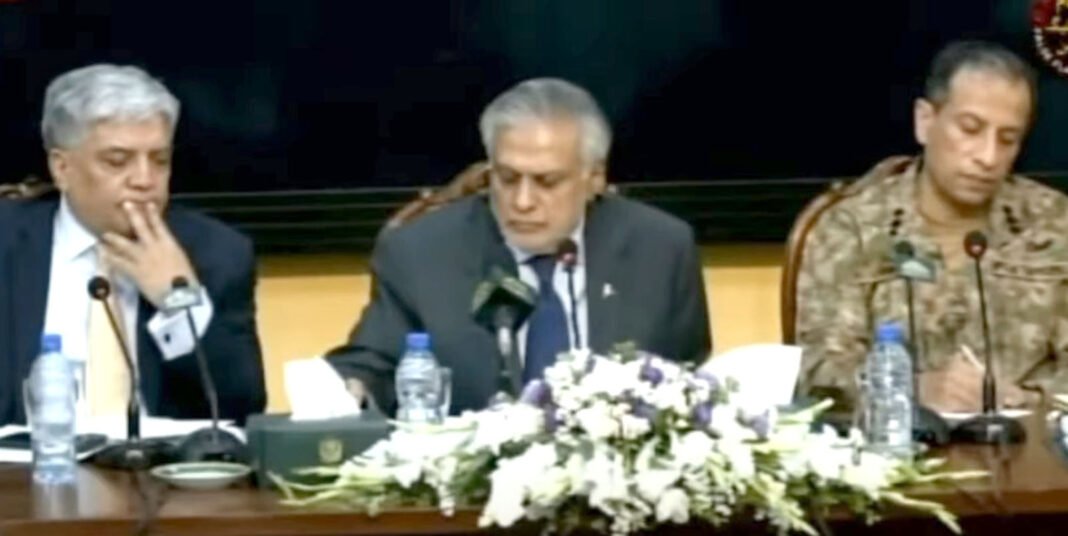Deputy Prime Minister and Foreign Minister Ishaq Dar, in a press conference held alongside Director General Inter-Services Public Relations (DG ISPR) Lieutenant General Ahmed Sharif Chaudhry and Foreign Office Spokesperson Shafqat Ali Khan, strongly condemned India’s reaction to the recent Pahalgam incident.
Dar criticized what he described as India’s irresponsible and aggressive attitude following the attack and reiterated Pakistan’s firm stance against all forms of terrorism. Emphasizing Pakistan’s long-standing commitment to peace and stability, he asserted that no motive or justification can validate the killing of innocent civilians, stating that the act of killing one human being is akin to killing all of humanity. This, he said, is not only Pakistan’s national policy but also aligns with Islamic principles.
Ishaq Dar categorically denied any involvement by Pakistan in the Pahalgam incident, pointing out that India was quick to accuse Pakistan without providing any credible evidence. According to him, this baseless blame game only fuels regional instability and distracts from the real issues. He voiced Pakistan’s sorrow over the loss of innocent lives and reiterated that no nation understands the pain of terrorism better than Pakistan, which has suffered countless attacks and has made enormous sacrifices in the fight against terrorism.
He further reminded the international community that while Pakistan has continuously been on the frontlines of the global war on terror, India has allegedly supported and even engaged in terrorist acts in other countries, including within Pakistan itself.
Dar also questioned the timing of the incident, pointing out that such attacks in India often coincide with visits by international figures. He suggested that there is a pattern to these incidents being used for political manipulation, especially to garner nationalist sentiment and distract from internal issues.
He accused the Indian media and political leadership of creating an uproar and media frenzy deliberately and systematically, turning every tragic event into a campaign based on speculation and without evidence. He referred to the Pulwama incident as a precedent, implying that India is once again employing similar tactics to create hostility and shift attention away from its internal matters, particularly human rights violations in occupied Kashmir.
Highlighting the increasing use of Islamophobic rhetoric in India, Dar expressed grave concern over what he described as a highly inflammatory and anti-Muslim narrative being pushed by Indian leaders and media. He warned that such divisive discourse poses a serious threat to regional peace and undermines the rights of Indian Muslims and Kashmiris. The Foreign Minister accused India of stoking tensions intentionally, not only to serve internal political objectives but also to isolate Pakistan internationally by building a negative image based on unsubstantiated claims.
Addressing the Indus Waters Treaty, Dar condemned India’s alleged threats to unilaterally suspend or divert Pakistan’s water supply, calling such moves illegal and unilateral. He stressed that the treaty contains no provision for such action without mutual agreement and warned that any attempt to tamper with water flow would be considered an act of war.
Water, he asserted, is the lifeline of the Pakistani people and must not be weaponized for political gain. The matter, he added, must be dealt with through the legal and diplomatic forums outlined in the treaty itself.
In closing, the Deputy Prime Minister reaffirmed Pakistan’s commitment to regional peace and its role as a responsible member of the international community. However, he issued a stern warning that any aggression from India would be met with a strong and proportionate response. While Pakistan does not wish to escalate tensions, it reserves the right to defend its sovereignty and territorial integrity under international law.
He emphasized that Prime Minister Shehbaz Sharif has already called for an independent investigation into the Pahalgam incident, and any terms of reference for such a probe should be based on consensus and credibility. Dar concluded by urging India to introspect and focus on its internal affairs rather than projecting blame onto others, which only serves to increase instability and mistrust in an already volatile region.


